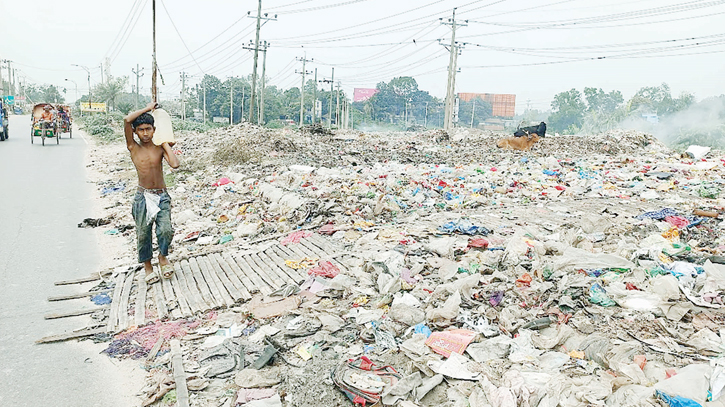
Photo : Messenger
The entrances to Tangail city at Rabna Bypass and Kagmari Shashman Ghat are plagued by garbage, posing health risks to locals and commuters. Despite longstanding issues with waste disposal, the municipality has failed to implement modern waste management practices. The stench from the open dumping sites has sickened residents and passersby, creating a dire situation.
Established on July 1, 1887, the Tangail Municipality accommodates over 200,000 residents within its 29.43 square kilometers area. Despite its long history, the municipality has yet to designate a proper site for garbage disposal or implement modern waste management techniques. Consequently, the streets, particularly along Rabna Bypass and Kagmari Shashman Ghat, are marred by unsightly heaps of refuse, creating a repugnant atmosphere for all who traverse them.
The plight of the residents and passersby is palpable. The nauseating stench permeates the air, prompting pedestrians to hasten their steps and commuters to shield their noses with clothing. Even the dead body of a cow lies amidst the filth, while scavengers rummage through the waste in search of salvageable items. The adverse effects of this neglect extend to nearby settlements and businesses, with residents and shopkeepers alike voicing their frustrations over the deteriorating conditions.
Delwar Hossain, a resident, laments the pervasive discomfort, highlighting the inability to enjoy even the most basic activities like cooking and eating due to the foul odor. School student Mahim recounts the physical toll of the stench, describing how it induces stomach discomfort during his daily commute. Shopkeeper Sarwar Hossain bemoans the decline in business, attributing it to customers' aversion to the unsanitary surroundings.
Transportation is also affected, as autorickshaw driver Tapas Dash attests to the reluctance of passengers to embark on journeys through the malodorous thoroughfares. Such conditions not only reflect poorly on the city but also pose significant health risks, as noted by medical experts who warn of respiratory ailments and the spread of disease due to airborne pathogens from the open garbage dumps.
Environmentalists like Gautam Chandra Chandra emphasize the ecological repercussions of such negligence, citing the detrimental impact on biodiversity and the surrounding ecosystem. Professor Saifullah underscores the broader consequences, including soil degradation and water contamination, while stressing the urgency of proper waste management practices.
In response to these mounting concerns, municipal authorities, including Mayor SM Sirajul Haque Alamgir and Deputy Commissioner Kaisarul Islam, have acknowledged the importance of the situation and pledged to expedite solutions. Plans for a modern slaughterhouse and waste management facility are underway, with efforts focused on securing suitable land for these initiatives.
The resolution of Tangail's waste management crisis requires concerted efforts from both governmental and community stakeholders. Only through collaborative action can the city hope to overcome its sanitation challenges and safeguard the health and well-being of its residents.
Residents endure not only physical discomfort but also psychological distress as they grapple with the perpetual assault on their senses. Moreover, the environmental degradation resulting from unchecked garbage disposal threatens the region's ecological balance, exacerbating existing environmental challenges. As such, swift and decisive action is imperative to mitigate the immediate risks and lay the groundwork for a sustainable future. It is incumbent upon all stakeholders to prioritize this issue and work collaboratively towards lasting solutions.
Messenger/Fameema








